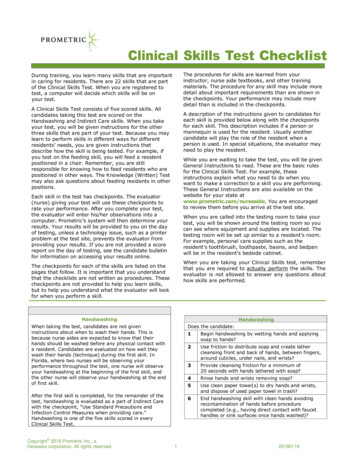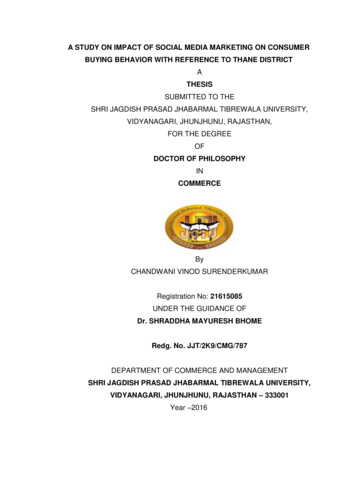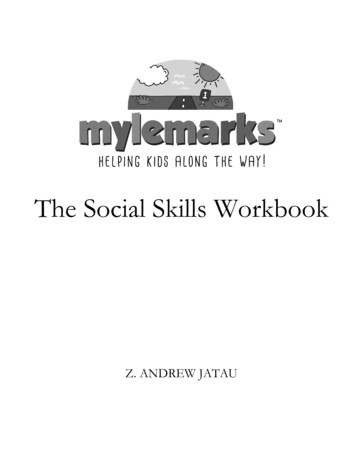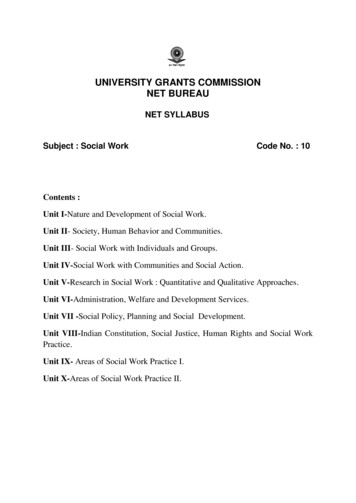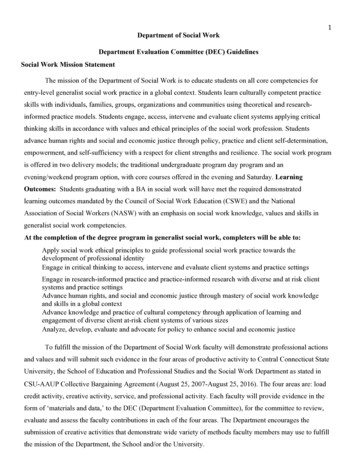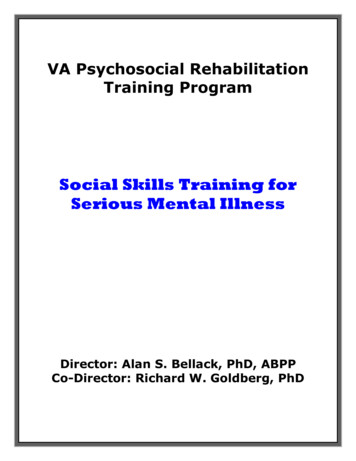
Transcription
VA Psychosocial RehabilitationTraining ProgramSocial Skills Training forSerious Mental IllnessDirector: Alan S. Bellack, PhD, ABPPCo-Director: Richard W. Goldberg, PhD
VA Social Skills Training for Serious Mental IllnessVA Social Skills Training for Serious Mental IllnessHANDBOOK TABLE OF CONTENTSSection I: Program and Workshop InformationBrief Program DescriptionProgram Staff (Baltimore)Program Staff (Los Angeles)SST Workshop Agenda2345Section II: Practical ResourcesSocial Skills Training ResourcesGuideline for Individual SessionsBrief Goal Assessment: Social Skills Training Individual Goal Assessment (Example)Sample Group Expectations HandoutExample Group Information Handout to VeteransGroup Session SequenceGoals Monitoring Sheet: Social Skills Goals Clinician Rating Scale (Example)Strategies for Common ChallengesTips for Dealing with Other Common Challenges in SST Groups7891011121315Consultation ResourcesConsultation Plan: Tape Viewing Plan and Competence RatingsTips for Identifying and Using Individual SST GoalsSocial Skills Group Observation ChecklistWeb Based Consultation Tracking System – Information and User InstructionsTips for Entering Helpful Information into the Web Based System6263656770Audio Recording ResourcesAudio Taping Consent TipsPrivacy Officer Documentation – Audio Tape Procedures for SST Facilitators and ConsultantsAudio Recorder – User Instructions747577Preparing for Facilitating GroupsDeveloping a CurriculumSample Curriculum DomainsSocial Skills Training Task Checklist – Immediately After WorkshopSocial Skills Training Task Checklist – Individual SessionsSocial Skills Training Task Checklist – SST Group SessionsMaterial and Practical NeedsImportant Pages in the SST BookRecruitment Planning7981828384858687Recruitment ResourcesExample Recruitment Flier for Patients – Open GroupExample Recruitment Flier for Patients – Closed GroupExample Treatment Team Handouts899091Clinical Notes ResourcesExample Clinical Note Template – Individual sessionsExample Clinical Note Template – Group sessions9495Additional ResourcesReference List for Social Skills Training971
VA Social Skills Training for Serious Mental IllnessProgram and WorkshopInformation2
VA Social Skills Training for Serious Mental IllnessBRIEF PROGRAM DESCRIPTIONVA Psychosocial Rehabilitation Training Program(a.k.a. VA Social Skills Training for Serious Mental Illness)Director:Co-Director:Alan S. Bellack, PhD, ABPPRichard W. Goldberg, PhDThe VA Psychosocial Rehabilitation Training Program (VA-PRT) is funded bythe Office of Mental Health Services at VA Central Office as part of an overallemphasis on increasing availability of evidence-based psychotherapy andother psychosocial treatments for Veterans. The program, based at the VAMaryland Health Care System, provides training, technical support andconsultation in evidence based psychosocial interventions to VA practitionersand mental health program leaders working with seriously mentally illveterans and their families. The program will train VA staff members inSocial Skills Training, through a combination of 2-day face-to-faceworkshops and 24-weeks of follow-up clinical supervision and consultation.VHA staff from around the country will be trained in Maryland and California.The VA-PRT program has an evaluation plan to assess the effects of thetraining.Additionally, availability of Social Skills Training is required for individualswith serious mental illness as per the Uniform Mental Health Services in VAMedical Centers and Clinics (2008). Specifically, the handbook requires that: Recovery and rehabilitation-oriented programs must be available for allSMI patients. A minimum array of services available to veterans in the program throughPRRC staff needs to include Social Skills training. Social skills training is an evidence-based psychosocial intervention thatmust be available to all veterans with SMI, whether it is provided on site,by referral, or by telemental health. Social skills training must be provided at all medical centers.3
VA Social Skills Training for Serious Mental IllnessPROGRAM PERSONNEL DIRECTORY– BALTIMORE STAFFPROGRAM PERSONNEL– BALTIMOREAlan S. Bellack, PhD, ABPPDirector, VA Psychosocial Rehabilitation Training ProgramAlan.Bellack@va.govRichard W. Goldberg, PhDCo-Director, VA Psychosocial Rehabilitation Training Programrgoldber@psych.umaryland.eduJoanna Strong Kinnaman, PhDProgram Manager/Consultantjokinnaman@earthlink.netMatthew Wiley, MPHProgram CoordinatorMatthew.Wiley@va.govJean S. Gearon, PhDTrainer/ConsultantJean@Gearons.comCynthia Clark, RNTrainer/ConsultantCynthia.Clark2@va.govWendy N. Tenhula, PhDWorkshop TrainerWendy.Tenhula@va.govAmy Drapalski, PhDTrainer/ConsultantAmy.Drapalski@va.govRebecca Pasillas, PhDTrainer/ConsultantRebecca.Pasillas@va.govSophia Autrey, MPHProgram EvaluatorSophia.Autrey@va.govBradley E. Karlin, PhDDirector, Psychotherapy ProgramsOffice of Mental Health Services, VA Central OfficeBradley.Karlin2@va.gov4
VA Social Skills Training for Serious Mental IllnessPROGRAM PERSONNEL DIRECTORY– LOS ANGELES STAFFStephen R. Marder, M.D.Director, VISN 22 MIRECCmarder@ucla.eduShirley M. Glynn, Ph.D.Trainer/Consultantsglynn@ucla.eduFrederick H. Martin, san Gingerich, MSWWorkshop Trainergingsusan@yahoo.comElizabeth A. Gilbert, a J. Hayden, m5
VA Social Skills Training for Serious Mental Illness2-DAY WORKSHOP AGENDADay 1:8:00a.m.Registration opens8:30a.m.Convene and Introductions8:45a.m.Plenary Presentation on Recovery and Introduction to VAinitiative for dissemination of Evidence Based Practices9:45a.m.Presentation of the Social Skills Training Model: What is themodel and how do you teach it?10:30a.m. Break10:45a.m. Video viewing of a SST group and discussion11:30a.m. Overview of VA-SST Project and Discussion of ConsultationModel12:00p.m. LUNCH1:00p.m.Breakout groups until 3:30p.m. (10-minute breaks at 1:50 and 2:50)3:45p.m.Orienting Veterans to the SST Groups4:15p.m.Brief role-play (in dyads) of dialogue with veteran to obtain consentand discussion4:25p.m.Participants will be asked to list three challenges they expect inimplementing social skills training groups at their agency.Participants will be asked to do this before they leave the room.4:30p.m.End of Training Day 16
VA Social Skills Training for Serious Mental Illness2-DAY WORKSHOP AGENDA (CONTINUED)Day 2:8:00a.m.Orientation to Day 28:15a.m.Panel discussion on strategies for common clinical challenges inconducting SST groups9:00a.m.Breakout groups until 12:00p.m. (10-minute breaks at 10 and 11)12:00p.m. LUNCH1:00p.m.Starting a Social Skills Training Group in the VA2:00p.m.BREAK2:15p.m.Technical Aspects of the VA-SST Project3:00p.m.Wrap-up and Evaluations3:30p.m.End of Training Day 27
VA Social Skills Training for Serious Mental IllnessSocial Skills TrainingResources8
VA Social Skills Training for Serious Mental IllnessGUIDELINE FOR INDIVIDUAL SESSIONS1. Introduction of facilitator(s)2. Discuss purpose of group; how different from “other” groups3. Discuss general format of groups (i.e., homework review, skillintroduction, role plays, feedback, homework)4. Discuss group expectations [NOTE: IF CLOSED GROUP MAY DOTHIS AT FIRST GROUP SESSION]5. Obtain informed consent for audio taping [NOTE: OBTAINCONSENT PRIOR TO AUDIO TAPING INDIVIDUAL TAPING]6. Goal setting7. Give handout with facilitator names and contact info, group settinginfo (time, room, etc.)9
VA Social Skills Training for Serious Mental IllnessBRIEF GOAL ASSESSMENT:SOCIAL SKILLS TRAINING INDIVIDUAL GOAL ASSESSMENT - EXAMPLEJane VeteranName:Date:9/15/08Education (highest level completed):11thCurrent occupation:Work in linen roomWork history:Used to clerical work ( 1982-1995); U.S. Army (1979-1982)What activities are you involved in on a daily or weekly basis?Watch t.v., go toVA to linen room and appointments, Go to coffee shop and play cardsAre there any activities that you are currently not participating in but would like to?Used to like to bowl, but can’t anymore with back problems; like to dopuzzles;Used to like photographyWho are the people you spend most of your time with?People in group home –especially Bob; People in linen room; My sister visits on some Saturdays ( 2Xper month)Are there people whom you do not currently spend time with but would like to?Iwouldn’t mind having a boyfriend; Can’t think of anyone elseIdentify two goals that you would like to achieve within the next 6 months (short-termgoals).1.Work 20 hours instead of 152.Maybe get camera fixedIdentify two goals that you would like to achieve within the next year (long-term goals).1.Get a boyfriend2.ndFrom Social Skills Training for Schizophrenia (2 ed.) by Alan S. Bellack, Kim T. Mueser, Susan Gingerich, and JulieAgresta. Copyright 2004 by The Guilford Press. Permission to photocopy this form is granted to purchasers of thisbook for personal use only (see copyright page for details).10
VA Social Skills Training for Serious Mental IllnessSAMPLE GROUP EXPECTATIONS HANDOUTSocial Skills TrainingGROUP EXPECTATIONS1.Please stay on the group topic.2.Only one person may speak at a time.3.No name-calling or cursing.4.No criticizing or making fun of each other.5.No eating or drinking during group.6.Others?11
VA Social Skills Training for Serious Mental IllnessEXAMPLE GROUP INFORMATION HANDOUT TO VETERANSWELCOME TO SOCIALSKILLS TRAININGGROUP!!In Social Skills Training groups, we will talk aboutand practice new ways of getting along with otherpeople. In this group we will not spend a lot of timetalking about problems and feelings. The main waygroup participants practice new skills is throughrole-plays (pretending to be in a particular situationand acting it out) and getting feedback from thegroup. The feedback is positive and the groups endup being fun.We look forward to you joining the group!Here is some important information for you about thegroups:Name of the Group Leader(s): Dr. GearonContact phone number: 222-5555When the groups are held: 3pm-4:30pm (time)Tuesdays & Thursdays (days of the week)Where the groups are held: 38 (building)2nd (floor)213B (room)12
VA Social Skills Training for Serious Mental IllnessGROUP SESSION SEQUENCE1. Review homework2. Give a rationale for the skill3. Briefly have members share a relevant experience or rationale4. Explain the steps of the skill5. Model the skill; review the model6. Have a group member role-play7. Give feedback8. Have the member role play again9. Solicit feedback from the group10. Repeat role-play again and provide feedback11. Repeat Steps 6-10 with each other group member12. Give out homework13
VA Social Skills Training for Serious Mental IllnessGOALS MONITORING SHEET:SOCIAL SKILLS GOALS CLINICIAN RATING SCALE - EXAMPLEName:Clinician:Jane VeteranDr. WhiteCheck Rating Period: Initial:Date: 12/27/08; 3 months X ; 6 months; Other time periodClinician: Please list all goals set at initial meeting as initial goals. All goals that aremodified should be listed in the lower section under “Modified/New Goals.” Any goalsset in subsequent meetings are also recorded in the “Modified/New Goals” section.Dates of goal outcomes should be placed in the selected boxes.Initial GoalsGoalsDate set1. Increase work hours9/15/08to 20 per week2. Start aconversation with amaleNotachievedPartially FullyModifiedachieved achieved (see New GoalsGoals5. Increase workModifiedfromgoal #Date set112/27/08NotPartially FullyModifiedachieved achieved achievedhours to 18 aweek6.7.8.ndFrom Social Skills Training for Schizophrenia (2 ed.) by Alan S. Bellack, Kim T. Mueser, Susan Gingerich, and JulieAgresta. Copyright 2004 by The Guilford Press. Permission to photocopy this form is granted to purchasers of thisbook for personal use only (see copyright page for details).14
VA Social Skills Training for Serious Mental Illness120PRINCIPLES, FORMAT, AND TECHNIQUESTABLE 8.2. Strategies for Common Problems in Social Skills Training GroupsGeneral Principles1. Encourage participation by each person according to his or her ability.2. Set clear expectations.3. Praise small steps toward improvement.Specific problemsDifficulty in followinggroup formatReluctance to role playProviding vague orcritical feedbackDifficulty in completinghomeworkStrategiesAt the beginning of group, remind members of format.As group progresses, point out each phase.Consistently redirect people when they go off the topic or interrupt others.Provide written handout or poster of format if problems persist.Acknowledge shy feelings.Engage person in observing others role play.Engage person in providing feedback.Start with a shortened version of role play.Gradually increase the number of steps to perform in a role play.Consistently model appropriate feedback.Guide people by asking questions about specific steps.Stop critical comments.Reframe criticisms into constructive suggestions.Provide handout or poster about feedback if problems persist.Write down assignments.Start with simple tasks.Help plan where, when, and with whom assignments will be completed.Review previous assignment at beginning of each session.Problem solve about obstacles encountered in completing assignments.Consistently assign and follow up homework.Request assistance in completion from family or staff members.Tailor assignment to the individual.ndFrom Social Skills Training for Schizophrenia (2 ed.) by Alan S. Bellack, Kim T. Mueser, Susan Gingerich, and JulieAgresta. Copyright 2004 by The Guilford Press. Permission to photocopy this form is granted to purchasers of thisbook for personal use only (see copyright page for details).15
VA Social Skills Training for Serious Mental Illness128PRINCIPLES, FORMAT, AND TECHNIQUESTABLE 8.3. Strategies for Problems Related to Clients Who Experience Severe SymptomsGeneral Principles1. Keep communication brief and to the point.2. Be consistent in maintaining structure and holding group at same time and in same place.3. Praise efforts and small steps toward improvement.4. Teach and review basic skills frequently.Specific problemsPoor attendanceCognitive difficultiesResponding topsychotic symptomsDistractibilityDisruptions relatedto symptomsWithdrawalStrategiesBuild rapport by communicating warmth and enthusiasm.Set small goals.Use reinforcers such as praise, money, food, increased privileges, timewith a favorite person.Enlist help of other staff members or family members.Identify obstacles to attendance.Consistently request person to attend.Keep group time relatively short.Check frequently whether people are understanding.Simplify language and instructions.Allow members ample opportunity to observe and practice skills.For delayed response, allow extra time for people to respond or suggestthat they take their turns later.Conduct shorter groups (30-40 minutes).Emphasize role plays rather than discussion.Give brief, clear instructions.Check frequently for comprehension.Assign active roles (such as role plays) to clients who are distracted bysymptoms.Keep other distractions to a minimum.Avoid lengthy explanations.Use examples, role plays to illustrate points.Redirect promptly to topic of group.Design engaging role plays that are relevant to real-life situations.Use a pleasant, sufficiently loud voice.Assign specific tasks to group members observing role plays.Reassure people of safety of group.Redirect kindly and firmly to topic of group.When appropriate, link content of disruption to skill being taught.Suggest discussing person’s off-topic concerns after group.Teach social skills designed to manage symptoms.Understand that withdrawal is not a criticism of leaders or group.Build rapport by communicating in a warm, low-key manner.Avoid excessive questioning.Avoid interpretations of why the person is withdrawn.ndFrom Social Skills Training for Schizophrenia (2 ed.) by Alan S. Bellack, Kim T. Mueser, Susan Gingerich, and JulieAgresta. Copyright 2004 by The Guilford Press. Permission to photocopy this form is granted to purchasers of thisbook for personal use only (see copyright page for details).16
VA Social Skills Training for Serious Mental IllnessTIPS FOR DEALING WITH OTHER COMMON CHALLENGES IN SST GROUPSChallenge: Veteran refuses role-playsPotential Solution(s):1. Encourage the veteran to observe others role-play and provide feedbackbefore role-playing2. Encourage veteran to try one or two steps of the role play first3. Allow the veteran to role-play from their seat versus coming to the center ofthe roomChallenge: Veteran is very quiet or keeps falling asleepPotential Solution(s):1. Encourage the veteran to come up and role-play next2. “Assign” the veteran to provide feedback on a specific step of a role-play3. Call on the veteran by name for feedback or input4. Keep group sessions lively and animatedChallenge: Veteran dominates the group (e.g., try to answer all the questions,jump in first with feedback after role plays)Potential Solution(s):1. “Assign” multiple veterans to provide feedback on a specific step of a roleplay2. Call on other veterans by name for feedback or input3. Encourage the veteran to do the next role-play4. Kindly remind the veteran to provide his/her peers opportunities to respond,provide feedback, participate, etc.Challenge: Veteran talks about outside topicsPotential Solution(s):1. Kindly acknowledge what the person said and redirect back to the group2. Use the agenda or group expectations of the group to get the person back ontrack (e.g., “OK. I heard what you said about difficulties with your payee. Butlet’s focus right now on Joe who is getting ready to do a role-play.”)3. Kindly acknowledge what the person said and encourage the veteran to comespeak with you after group4. Kindly acknowledge what the person said and encourage the veteran todiscuss the issue in another forum (e.g., individual session with casemanager, another group)5. When relevant, encourage the veteran to practice a role-play scenario relatedto the topic they are discussing6. Post “Group Expectations” in group room or provide as handouts at thebeginning of group17
VA Social Skills Training for Serious Mental IllnessTIPS FOR DEALING WITH OTHER COMMON CHALLENGES IN SST GROUPS(CONTINUED)Challenge: Veteran is a high functioning client who says how easy this is forhim/herPotential Solution(s):1. Encourage the veteran to use his/her skills and provide helpful feedback toother group members2. Ask the veteran to help you model the skill3. Make role-play scenarios for the veteran a bit more challenging4. Focus on the veteran’s goals when discussing the rationale for using the skilland when creating role-play scenariosChallenge: Veteran makes critical feedback about others' role-playsPotential Solution(s):1. Kindly remind the veteran to start with positive feedback after role-plays2. When providing corrective feedback, rephrase critical comments toconstructive feedback3. Develop group expectations that group members provide positive feedbackfirst and then corrective/constructive feedback on role-plays4. Post “Group Expectations” in group room or provide as handouts at thebeginning of groupChallenge: Veteran displays manic symptoms (may need to pace, speak rapidly,etc.)Potential Solution(s):1. Encourage the veteran to come up and role-play next2. “Assign” the veteran to provide feedback on a specific step of a role-play3. Call on the veteran by name for feedback or input4. Encourage the veteran to take a break from the group18
VA Social Skills Training for Serious Mental IllnessConsultation Resources19
VA Social Skills Training for Serious Mental IllnessCONSULTATION PLAN: TAPE REVIEWING PLAN AND COMPETENCE RATINGSIndividual (goal setting) Sessions:o Consultants will listen to at least one full individual session of eachclinician.*o Clinicians will be asked to report the goals of each veteran after everyindividual session through the web-tracking system.o If a clinician asks for additional assistance through the web-trackingsystem on an individual session, the consultant will listen to that tape,or part of tape, (if available) and provide feedback regardless if it is a“required” tape to listen to.Group Sessions:o Consultants will initially listen to (all) full group session tapes ofclinicians.o After a clinician reaches competence, consultants will listen to everyfourth tape. They will listen to full sessions of these tapes.o If a clinician asks for additional assistance through the web-trackingsystem on a particular part of a session, the consultant will listen tothis part and provide feedback regardless if it is a “required” tape tolisten to.o If a clinician starts to demonstrate difficulties in facilitating the groupafter they reach competence, a consultant may request that theclinician audiotape additional groups.*Note: The clinician will be asked to start audio-taping the individual sessionafter they obtain consent. Therefore, the entire session will not be taped.Clinician Competence Plan:Consultants will rate clinician competence in order to inform and guidedecisions about consultation. Clinicians continue in consultation for the fullconsultation period ( 24 weeks) regardless of competence status.The primary measure used to rate competence is the SOCIAL SKILLS GROUPOBSERVATION CHECKLIST (Bellack, Mueser, Gingerich, & Agresta, 2004).This measure includes two sections. The first section includes 8 items relatedto general group structuring and positive engagement skills; the secondsection includes 9 items measuring facilitation of each of the steps in socialskills training. Each item is rated as “Fully”, “Partially”, or “Not at all”performed.20
VA Social Skills Training for Serious Mental IllnessTIPS FOR IDENTIFYING AND USING INDIVIDUAL SST GOALSAfter each clinician demonstrates competence in leading SST groups, clinicians willbe encouraged to work on developing and utilizing veterans’ social skills goals. Thisincludes clinicians become skilled at helping veterans set appropriate social skillsgoals and using those goals within the social skills groups to help veterans movetowards the things in their lives that are important to them and their recovery.As defined below, consultation around SST goals will be focused on helpingclinicians (1) identify appropriate SST goals; (2) identify role-play scenarios andpractice assignments related to veterans’ goal(s); and (3) monitor the goal of atleast one veteran during SST group participation.I. Identifying goalsConsultants will assist clinicians in helping at least one veteran identify anappropriate SST goal. There are three major components related to helpingveterans identify appropriate goals:(1) Relate goal to social skills. Although veterans may come up with a widevariety of goals or areas that they want to work on, it is important that their goal(s)focus on socially related interactions or interpersonal relationships.(2) Identify an objective goal. Many veterans may describe unspecific goals suchas “I want to feel better” or “I want to have higher self-esteem.” The clinicianshould help the veteran establish a goal that is observable. Most likely the clinicianwill use a questioning method to help the veteran shape the goal from somethingsubjective and vague to something that could be observed by an outsider. Anexample of a question that might help develop a more objective goal is, “If you hadhigher self-esteem what would you be doing more often; or be doing less often?How would socially related aspects of your life be different?” Examples of moreobjective goals might include: I want more friends, I want to have moreconversations, I want to see my family more often. The clinician should help theveteran establish a realistic and attainable goal.(3) Make goal measurable. After the veteran is able to establish their goal inobjective terms, it is recommended that the clinician help the veteran make thegoal measurable. A very helpful way to start this process is to ask the veteran howmany conversations, for example, they currently have in a week in order toestablish a baseline. The clinician can then be encouraged to follow-up with whatthe vet wants for their goal. To continue with the same example as above, thismight include a question such as, “How many conversations would you want to tryto have with other individuals per week?” The clinician should be encouraged tohelp the veteran come up with a number that is realistic and attainable.In addition to goals being related to SST, objective, measurable, and attainable,goals should also be focused more on near-term rather than long-term goals. Aveteran may establish a longer-term goal (e.g., find a girlfriend) and the clinicianshould be encouraged to help the veteran clarify short-term goals that are21
VA Social Skills Training for Serious Mental Illnessintermediate steps toward that longer-term goal (e.g., have a conversation with awoman).II. Utilizing SST goalsA critical component of using social skills goals is to help veterans establishopportunities to practice scenarios related to their goals. The two primary means ofencouraging this type of practice is through role-play scenarios and homeworkassignments. Consultants will encourage clinicians to help veterans develop roleplay scenarios and homework assignments that are related to veterans’ goal(s) inat least one SST group.Role-play scenarios. After clinicians have mastered the basic concept of the SSTgroups, clinicians will be encouraged to use veterans’ SST goals in the groups (ifthis has not yet occurred). When clinicians are helping veterans develop scenarios,they should ask veterans about their goals or remind them what their goals are.They should work collaboratively with the veteran to develop scenarios they canpractice related to their goals.Homework assignments. Homework is an excellent forum to facilitate opportunitiesfor veterans to work towards their goals. Clinicians should work with veterans in acollaborative fashion to establish plans for homework that are related to veterans’goals. The ultimate goal for homework development that is the veteran knows whothey will practice with and what they will practice prior to leaving the group; it isoften helpful for veterans to know where and when they will practice (i.e., whenthey will see or speak with the individual again).III. Monitoring goalsConsultants will encourage clinicians to monitor how veterans are progressingtoward their goals. Consultants will ask clinicians to monitor the goal of at least oneveteran during SST group participation. This ongoing process is important for avariety of reasons: (1) it helps establish that the goal(s) developed are reasonableand attainable or if the goal(s) need to be revised; (2) monitors when veteranssucceed in reaching goal(s) and need to develop new one(s); (3) monitors when agoal should be modified based on repeated problems reaching a goal; and (4)monitors when veterans want to change or amend their goals.Goal monitoring can occur in several different ways. The Bellack et al., (2004)Social Skills book includes worksheets that can be used both by clinician andveterans to monitor how each veteran is doing with the goals they established (seePage 316 for the Social Skills Goals Self-Rating Scale and Page 317 for the SocialSkills Goals Clinician Rating Scale). Clinicians may also choose to use the GoalAttainment Scaling system to establish and monitor goals. Clinicians may choose tomonitor goals using solely verbal methods of checking in. Clinicians may find itmost useful to monitor goals of veterans briefly at the beginning of group on aregular basis (e.g., monthly basis). Clinicians may also choose to have regular,brief individual sessions with the veterans to check in about how the group is goingand to monitor progress toward SST goals.22
VA Social Skills Training for Serious Mental IllnessSOCIAL SKILLS GROUP OBSERVATION CHECKLISTGroup Leader:Date:Consultant:Instructions: Complete this checklist after observing the group leader conduct a session. Foreach item, check off whether the group leader performed this skill “not at all”, “partially”, or“fully.”General structuring and positiveengagement skillsCreated a warm, welcomingatmosphere.Not at allPartiallyFullySpoke clearly, using a voice neitheroverloud nor oversoft.Established an agenda andmaintained the structure of thesession.Provided ample positive feedback forparticipation.Redirected group members whointerrupted or strayed from the topic,using a kind but firm voice.Asked group members for examplesof personal experiences in whichskills could be or were used.Used a shaping approach to helpmembers gradually learn new socialskills by reinforcing small stepstoward the targeted skill.Encouraged group members to beactively involved in the session.(Members can be active in differentways, such as reading the steps ofthe skill out loud, providing arationale, providing feedback for roleplays, participating in role plays,contributing examples of personalexperience.)(continued)ndFrom Social Skills Training for Schizophrenia (2 ed.) by Alan S. Bellack, Kim T. Mueser, Susan Gingerich, and JulieAgresta. Copyright 2004 by The Guilford Press. Permission to photocopy this form is granted to purchasers of thisbook for personal use only (see copyright page for details).23
VA Social Skills Training for Serious Mental IllnessSOCIAL SKILLS GROUP OBSERVATION CHECKLIST (page 2 of 2)Steps of social skills trainingNot at allPartiallyFullyReviewed homework from theprevious group session.Established a rationale for using theskill.Discussed the steps of the skill withgroup members.Modeled the skill in a role-play.Reviewed the model with the groupmembers.Engaged all group members in arole-play of the skill.Provided or elicited behaviorallyspecific positive feedb
Sep 15, 2008 · PRRC staff needs to include Social Skills training. ocial skills training is an evidence-based psychosocial intervention that S must be available to all veterans with SMI, whether it is provided on site, by referral, or by telemental health. ocial skills tra



